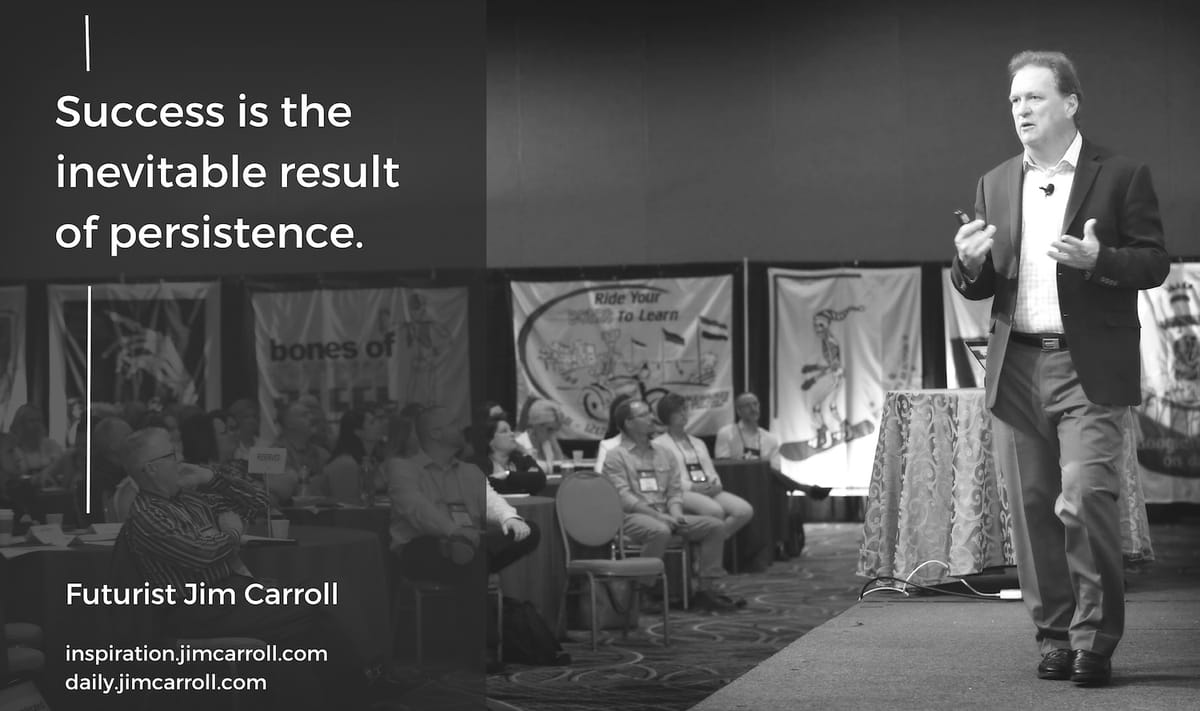"Success is the inevitable result of persistence" - Futurist Jim Carroll
Persistence is the art of making repeated mistakes until you get it right - and it's a critical pathway to innovation and success.
Don't give up.
Abandoning your effort is never a great idea!
After all, James Dyson went through 5,126 prototypes over 15 years before creating the first bagless Dyson vacuum cleaner. Colonel Sanders was rejected over 1,000 times before finding a partner for his fried chicken recipe, which became the basis for Kentucky Fried Chicken. Thomas Edison made thousands of prototypes - and suffered multiple failures - before inventing a successful incandescent light bulb. Walt Disney faced multiple bankruptcies and rejections before creating Disneyland and achieving success in talking films. Jeff Bezos started Amazon in a garage, facing skepticism and financial challenges, before turning Amazon into an e-commerce giant. Howard Schultz had to persistently pitch his coffee shop idea, which was initially rejected by Starbucks' founders, before transforming the company. Rovio Entertainment created 51 unsuccessful games before hitting it big with Angry Birds.
The list goes on. Success comes not just from having the right idea, but from sticking with it to completion - and beating back the barriers that exist with the path forward.
What do people do to develop persistence?
They celebrate small victories along the way, recognizing that many small wins might help to lead to a big win. They learn from the failures that occur through the process, using them as a basis for encouragement - instead of being discouraged by them. They surround themselves with supportive and positive people - recognizing that they'll need their support when the inevitable lows of the innovation process settle in. And most important - they say committed even when progress seems slow, by measuring small steps as big wins. All the time throughout this process, they continually visualize their eventual success - they keep their goal in mind.
There are important lessons in the idea of persistence, in that the very process of innovation comes from regularly overcoming challenges and setbacks - success rarely comes without the need to face many obstacles along the way. The idea of persistence allows individuals and organizations to push through difficulties, learn from failures, and continue striving toward the end goal. The key idea is that each setback is not viewed as a failure but as an opportunity to refine and improve. That's where the idea of 'continuous improvement' comes from - the whole idea is that you are constantly learning, adapting, and refining your ideas. This entire process allows you to continue building a deeper level of expertise - what I call 'experiential capital.' Persistence also helps to build resilience, which is necessary to battle back against the volatility that will come from chasing a new idea.
Persistence is also a mindset. Innovation involves being a pioneer, which means you are constantly battling back against the inevitable skepticism and resistance that comes from new ideas. Persistence is necessary to challenge the status quo, introduce novel concepts, and implement radical ideas. The very process of persistence will help you enhance your adaptability - in the process of being persistent, you'll develop a lot of skills as to how to learn to adapt to rapidly changing circumstances. This adaptability is crucial for innovation, as it allows for pivoting and adjusting in response to changing circumstances, raging volatility, and unknown twists and turns.
Years ago, author Malcolm Gladwell popularized the idea of the "10,000-Hour Rule" - the idea being that achieving mastery in any field requires extensive, dedicated practice. Many debate the validity of the idea - but regardless of what you might think about it, persistence is at the heart of it.
Persistence should be your goal - not just success - because it is a necessary element to the very success you chase!
Futurist Jim Carroll has demonstrated his mastery of persistence by his efforts to take up both skiing and golf later in life.

